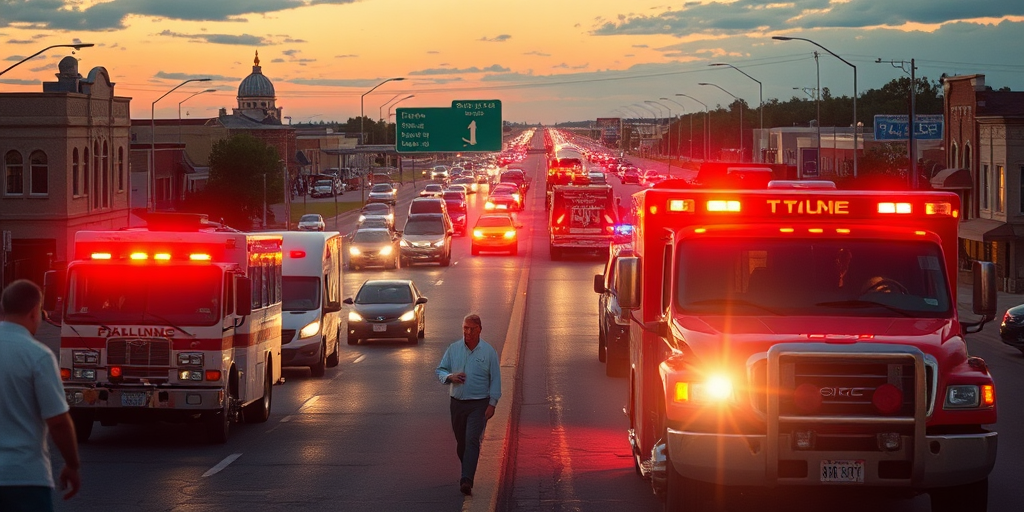Harlingen Expressway Traffic Stalls RGV Community
In a recent development affecting the daily routines of many Rio Grande Valley residents, traffic on the Harlingen expressway came to a complete halt near Exit 24. The standstill conditions were reported on the eastbound lanes towards F Street and Rangerville Road, involving necessary intervention from the Harlingen Fire Department and EMS. Despite outreach, direct comments from officials were not available at the time of reporting.
Understanding the Scenario
On July 14, 2025, surveillance footage provided by the Texas Department of Transportation revealed traffic in Harlingen at a standstill, affecting numerous commuters in the area. The congestion drew considerable attention as the Harlingen Fire Department and EMS were both involved at the scene. The precise cause of the delay and the implications for those caught in the gridlock remain unspecified, pending further information from officials.
As reported by ValleyCentral, the absence of direct comments from local authorities has left residents speculating about the factors contributing to such significant traffic issues. Local commuters often rely on this expressway as a vital route for their daily movements, making the impact on the community particularly significant.
Local Impact: Community Sentiments
For Valley residents, particularly those commuting within South Texas, traffic hindrances such as these represent more than just minor inconveniences. They highlight broader infrastructural challenges that can disrupt everyday life. Harlingen resident Mariela Gonzalez expressed concern, stating, “Every minute counts when you’re juggling work and family commitments. We hope the local government will address these issues promptly to ease the burden on commuters.”
According to local businesses located near Exit 24, the unexpected traffic standstill resulted in delayed deliveries and disrupted supply chains, illustrating the ripple effect of such disruptions on the local economy.
Linking to Broader Regional Concerns
While traffic delays are not uncommon in bustling urban areas, this recent incident in Harlingen resonates with ongoing infrastructural challenges within the RGV. Given its growing population and economic activities, the region has frequently grappled with the demand for improved roadways and traffic management solutions.
Local authorities have historically aimed at addressing these issues through proposed infrastructure projects and investments, yet incidents like this underscore the need for accelerated actions and thorough planning.
Future Implications and Hope for Solutions
As the city of Harlingen and Cameron County continue to explore measures to enhance roadway networks, one of the critical focal points remains the expressway systems that serve as lifelines for economic and social connectivity. Planning for future expansions or implementing real-time traffic update systems could provide relief to Valley residents and businesses alike.
ValleyCentral remains committed to demographic engagement and safety promotion in South Texas. Through comprehensive coverage and features like live traffic updates, the platform aims to equip residents with crucial information needed for informed decision-making.
Dr. Juan Rivera, an urban planning expert at the University of Texas Rio Grande Valley, suggests incorporating smart technology solutions. “Advancing infrastructure using technology like smart traffic signals or enhanced public transit can alleviate not just immediate issues but also improve long-term commuting efficiency in the Valley,” he said.
Community Resources and Action
While this traffic event may have been isolated, the importance of continued readiness to respond to such challenges cannot be understated. Residents are encouraged to make use of ValleyCentral’s various resources, including real-time weather and traffic updates, to better navigate daily commutes.
For those seeking additional information on local infrastructural planning and community feedback, the City of Harlingen hosts regular public forums and meetings. Such interactions provide a platform for residents to express concerns and propose solutions directly to city planners and officials.
This incident serves as a reminder of the dynamic aspects of urban life in the RGV, where community interest and local developments coalesce. By engaging fully in the process, Valley residents can ensure that their needs and voices shape the future infrastructural landscape of their communities.







